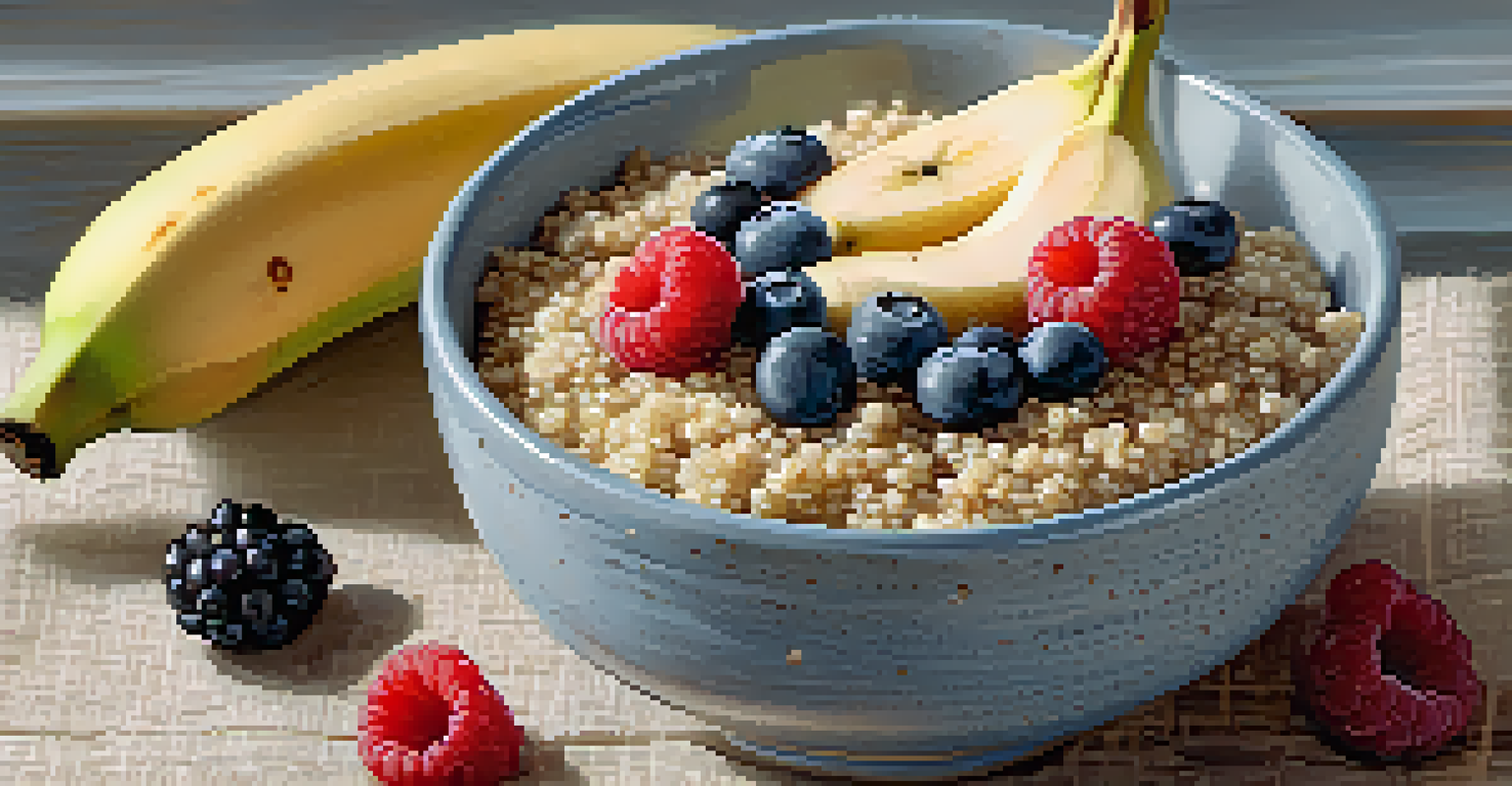The Importance of Whole Grains in Preventive Nutrition

What Are Whole Grains and Why Are They Important?
Whole grains encompass the entire seed of a plant, including the bran, germ, and endosperm. This means they retain all their natural nutrients, unlike refined grains that often lose valuable vitamins and minerals during processing. Incorporating whole grains into your diet is crucial for overall health since they are packed with fiber, antioxidants, and essential nutrients.
Whole grains are a key component of a healthy diet, providing essential nutrients and fiber that can help reduce the risk of chronic diseases.
Examples of whole grains include brown rice, quinoa, oats, and whole wheat. These grains not only provide energy but also support various bodily functions, such as digestion and immune response. Understanding what whole grains are helps us appreciate their importance in a balanced diet.
As we shift to a more health-conscious society, the role of whole grains in preventive nutrition becomes evident. They serve as a foundation for a nutritious diet, helping to ward off chronic diseases while promoting overall well-being.
Health Benefits of Whole Grains for Preventive Nutrition
Whole grains offer numerous health benefits that contribute to preventive nutrition. They are rich in dietary fiber, which aids in digestion, helps maintain a healthy weight, and lowers cholesterol levels. This fiber content can also help regulate blood sugar levels, making whole grains an excellent choice for those managing diabetes.

In addition to fiber, whole grains are loaded with vital nutrients such as B vitamins, iron, magnesium, and selenium. These nutrients play key roles in energy production and overall health, supporting metabolic functions and enhancing your immune system. By including whole grains in your meals, you are taking a proactive step towards better health.
Whole Grains Boost Overall Health
Whole grains retain essential nutrients and support various bodily functions, making them crucial for a balanced diet.
Moreover, studies have shown that regular consumption of whole grains is linked to a reduced risk of heart disease, stroke, and certain cancers. This evidence underscores their importance in preventive nutrition, making them an essential component of a healthy lifestyle.
How Whole Grains Support Digestive Health
One of the standout benefits of whole grains is their positive impact on digestive health. The high fiber content found in these grains helps to keep your digestive system running smoothly by promoting regular bowel movements. This can prevent issues like constipation and bloating, which are common complaints in today's fast-paced world.
Eating whole grains can improve your digestive health and help you maintain a healthy weight.
Furthermore, whole grains serve as prebiotics, which feed the beneficial bacteria in our gut. A healthy gut microbiome is essential for digestion, nutrient absorption, and even mental health. By nourishing these good bacteria, whole grains help create a balanced gut environment, contributing to overall digestive wellness.
Incorporating whole grains into your diet can be as simple as choosing whole grain bread over white bread or adding quinoa to salads. Small changes can lead to significant improvements in your digestive health, making whole grains a smart choice for anyone looking to enhance their nutrition.
Whole Grains and Their Role in Weight Management
Managing weight can often feel like a daunting task, but whole grains can make it easier. Their high fiber content not only keeps you feeling full longer but also helps regulate hunger hormones. This means that when you include whole grains in your meals, you're less likely to reach for unhealthy snacks throughout the day.
Additionally, whole grains have a lower glycemic index compared to refined grains, meaning they cause a slower rise in blood sugar levels. This can help control cravings and stabilize energy levels, making it easier to stick to a healthy eating plan. When you feel satisfied and energized, weight management becomes a more achievable goal.
Heart Health Benefits of Whole Grains
Regular consumption of whole grains is linked to a reduced risk of heart disease and improved cardiovascular health.
By incorporating whole grains into your diet, you can enjoy delicious meals while supporting your weight management efforts. Whether it's brown rice in your stir-fry or whole grain pasta in your favorite dish, these grains can be both satisfying and nutritious.
Whole Grains and Heart Health Connection
Heart health is a top priority for many, and whole grains play a significant role in maintaining it. Research indicates that those who consume whole grains regularly have a lower risk of developing heart disease. This is primarily due to their ability to lower cholesterol levels and reduce inflammation in the body.
The antioxidants found in whole grains, such as phenolic acids, also contribute to heart health by protecting blood vessels and improving circulation. These compounds work to combat oxidative stress, which can lead to heart-related issues. By incorporating whole grains into your diet, you're not only nourishing your body but also supporting your cardiovascular system.
Simple swaps, like choosing whole grain bread for sandwiches or opting for whole grain cereals, can have a profound impact on your heart health. Embracing whole grains as part of your daily routine is a step towards a healthier heart and a longer life.
Practical Tips for Incorporating Whole Grains
Incorporating whole grains into your diet doesn't have to be overwhelming. Start by making small, gradual changes, such as replacing white rice with brown rice or choosing whole grain pasta for your favorite dishes. These simple swaps can make a significant difference in your overall nutrition.
Another great way to enjoy whole grains is by experimenting with different recipes. Try adding quinoa to salads, oats to smoothies, or barley in soups. By exploring various grains and their flavors, you can keep your meals exciting and nutritious.
Fiber in Whole Grains Aids Digestion
The high fiber content in whole grains promotes digestive health by preventing constipation and supporting a healthy gut microbiome.
Don't forget to read food labels when shopping. Look for products that list whole grains as the first ingredient and avoid those with added sugars and unhealthy fats. With a little mindfulness, you can easily elevate your meals with the goodness of whole grains.
Common Misconceptions About Whole Grains
Despite their many benefits, there are still misconceptions surrounding whole grains. One common myth is that whole grains are always less tasty than refined grains. In reality, whole grains can add unique flavors and textures to your meals, enhancing your culinary experience rather than detracting from it.
Another misconception is that whole grains are difficult to prepare. In fact, many whole grains, like quinoa and brown rice, can be cooked quickly and easily. With a little practice, you'll find that they can fit seamlessly into your meal prep routine.

It's also important to note that not all products labeled as 'whole grain' are genuinely healthy. Always check the ingredient list to ensure that whole grains are at the top and that there are no hidden unhealthy ingredients. By debunking these myths, you can confidently embrace whole grains as a vital part of your diet.